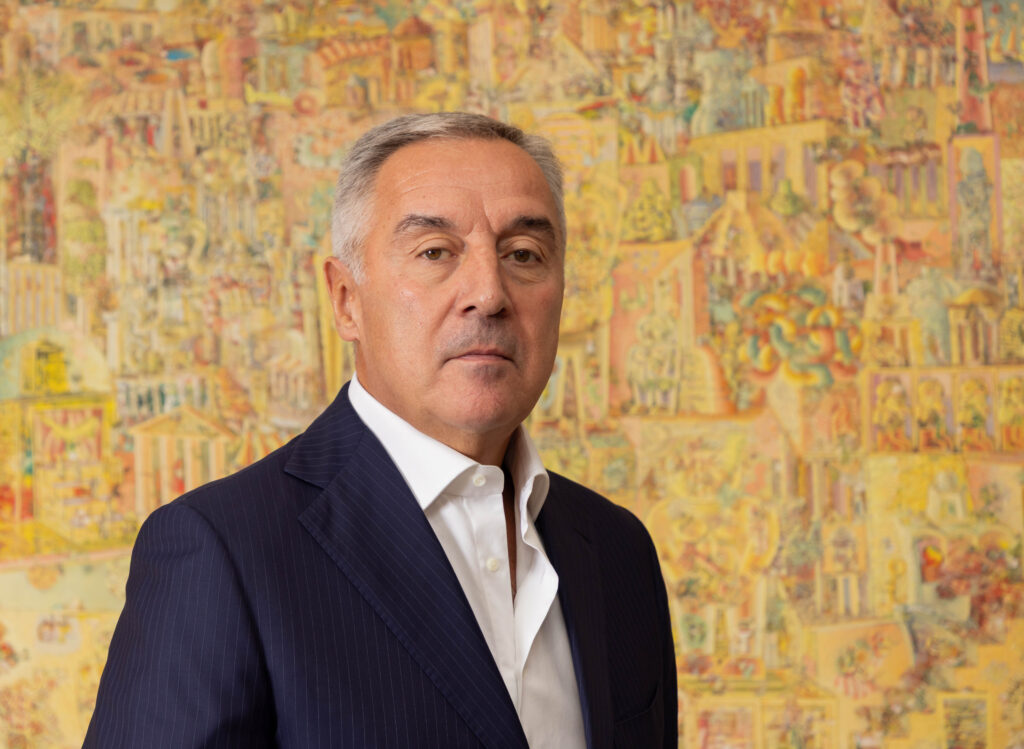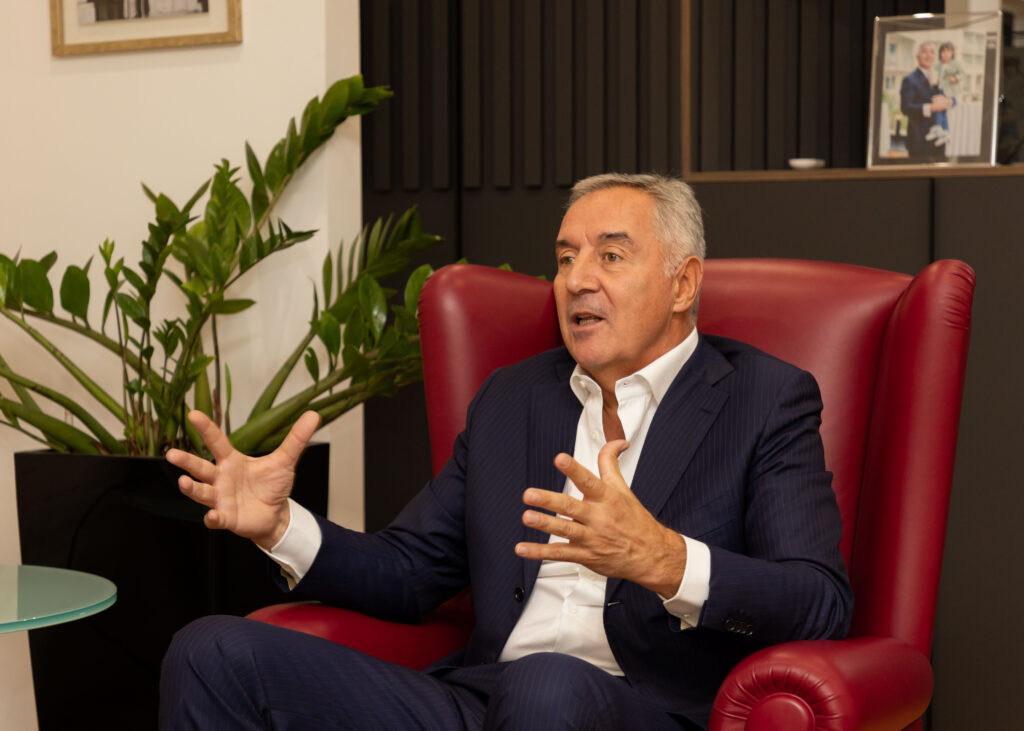Reflections on Montenegro’s post-independence progress, institutional challenges, and the Western Balkans’ European future
 In this excerpt from a larger exclusive interview given to Diplomacy & Commerce Montenegro magazine, former President of Montenegro Milo Đukanović reflects on the legacy of Montenegrin independence nearly two decades after the 2006 referendum. He shares his views on the country’s most significant achievements, including the preservation of peace, economic sustainability, and multiethnic harmony. Đukanović also discusses the challenges of institutional development, the importance of responsible governance, and offers a broader vision for the Western Balkans as an integral part of the European geopolitical future.
In this excerpt from a larger exclusive interview given to Diplomacy & Commerce Montenegro magazine, former President of Montenegro Milo Đukanović reflects on the legacy of Montenegrin independence nearly two decades after the 2006 referendum. He shares his views on the country’s most significant achievements, including the preservation of peace, economic sustainability, and multiethnic harmony. Đukanović also discusses the challenges of institutional development, the importance of responsible governance, and offers a broader vision for the Western Balkans as an integral part of the European geopolitical future.
Montenegro recently marked 19 years since the referendum that restored its statehood—nearly two decades that have significantly shaped its modern identity, both politically, economically, and internationally. When you reflect on that period, what do you consider the greatest achievement, and which areas of development remain to be fulfilled?
As I’ve already mentioned, we generally experienced difficult times despite achieving substantial results. Still, I believe that everything that was done is truly valuable. Among the things I’m particularly proud of, I would highlight that Montenegro managed to preserve peace in the early 1990s. Considering the events unfolding in our surroundings at the time, Montenegro was the only former Yugoslavian republic on whose territory there was no war.
Given Montenegro’s predominantly warrior-like history and tradition, I view that as a significant achievement. In a way, I believe that within this current generation living in Montenegro, life is gaining greater value. Historically, Montenegro nurtured a cult of heroic death. Now we’re seeing the emergence of a cult of life—life itself is more appreciated. Of course, these are long processes, and we’ll see what the long-term outcomes of Montenegro’s social emancipation will be. But I am confident that during this period, a new phase of awareness has begun to form around the values that matter most.
Secondly, I believe we have learned to value societal stability. Without stability, there can be no development, and people often flee unstable societies. Montenegro underwent a significant stage of intensive economic growth, thanks to a dynamic influx of foreign investment. Capital is cowardly—investors avoid instability. That inflow of capital testifies that Montenegro was seen as a stable and attractive investment destination.
During that period, we also strengthened Montenegro’s multiethnic and multireligious character. Historically, Montenegro was a multiethnic state, and we reaffirmed that identity when, during the regional turmoil, a vast number of refugees and displaced persons from war-torn areas sought refuge in Montenegro. These were people of different faiths and nationalities. At one point, they made up 20% of the population—an almost unimaginable figure. Imagine if 20% of the population in the United States, Germany, or France were suddenly foreign-born. And yet, in Montenegro, this helped reinforce trust in coexistence and multiethnic, multireligious community life.
It is also worth mentioning that we achieved economic self-sustainability. Throughout history, Montenegro often relied on external support. However, from the early 1990s to the present, Montenegro has thrived on its own merits and, through its capabilities, has become an inspiring destination for investment. Wealthy people began to arrive, bringing not only valuable physical developments but also new structures and standards. Porto Montenegro is fully competitive with marinas in Monte Carlo, Cannes, or Porto Cervo. It was also crucial to partner with the right individuals.
Life is becoming more valued in Montenegro—we are moving from a cult of heroic death to a culture of living
Furthermore, it is worth noting that in 2002, we introduced the euro, following the German mark, which strengthened investor confidence and was a crucial step toward Montenegrin independence. I would say it was a decisive step. It helped raise awareness among people in Montenegro that it was time to move beyond a fundamentally flawed economic environment. At the time, the Yugoslav dinar had been completely devalued. We didn’t even consider printing our traditional currency, the perper, which might have made sentimental or symbolic sense. Instead, we decided to protect Montenegro from the risk that some future irresponsible actor might one day print the perper, and we’d end up with a devalued perper, just like we’d have a devalued dinar. Montenegro needed a stable, convertible currency to support its economy’s recovery and growth.
Ultimately, we restored independence—a centuries-old dream for generations of Montenegrins—and we did it in a distinctly European manner, without jeopardising the country’s stability for even a moment. It was carried out democratically and in strict compliance with the rules set by the EU. Ultimately, we aligned Montenegro with the direction it had historically followed. That path was logically chosen, reinforced by a deeper understanding that we had to become, not only geographically but also culturally, part of the European cultural sphere. Europe is our natural habitat, and we must move toward it. However, to move in that direction, we must organically align with it, which means embracing its standards. Otherwise, we’ll stand out as outsiders, even “outcasts,” from that society.
When you move toward Europe, you are also moving along the path of NATO, as part of Euro-Atlantic integration.
On the other hand, what could not realistically be completed in such a short time was institutional development. When I first stepped down as Prime Minister in 2006—after the successful referendum and subsequent parliamentary elections—I said it was time for personal authority to be replaced by institutional authority. I wanted to emphasise that the democratic and economic development of a country depends heavily on the strength of its institutions.
Countries with well-developed institutions can survive poor governance. For countries without them, bad governance can be fatal. That’s why it’s essential, especially for a young state, to establish its institutions thoroughly and consistently. Has that truly happened over the past five years in Montenegro? I’d be more inclined to say no than yes. However, those, too, are lessons we must learn.
Montenegro eventually changed government and gained a leadership that was the only real alternative to the previous one. Today, the citizens of Montenegro are better equipped to assess what truly serves their long-term interest.
I believe what matters most now is for Montenegro to have a nationally responsible government—one that will patiently and persistently continue building institutions, so that they become the reliable foundation for the country’s future social development.
 The Western Balkans remains a space where regional and global interests intersect. At a time when there is growing talk of the need for a “new approach” to this part of Europe, what vision of the region’s future do you see as realistic?
The Western Balkans remains a space where regional and global interests intersect. At a time when there is growing talk of the need for a “new approach” to this part of Europe, what vision of the region’s future do you see as realistic?
Everything I said about Montenegro also applies to the Western Balkans. The Western Balkans must become part of modern European integration. The prerequisite for that is the implementation of serious reforms within Western Balkan societies—reforms that will make us an organic part of contemporary Europe.
In my view, slipping in through the “back door” is not a serious option. You might formally become part of an integration if someone already inside lets you in, but you will still feel like a stranger there.
Another key principle is that integration is equally in the interest of the Western Balkans and of Europe. As I’ve already pointed out, Europe is facing major challenges in shaping a new geopolitical model. The Cold War model is over, whether some want to accept that or not. Likewise, the era of a unipolar world, with one superpower as the sole hegemon, is over.
There is no geopolitical vacuum—where Europe is absent, others step in
We are on the brink of a new geopolitical configuration, and it will be particularly challenging for Europe. That’s why Europe must act quickly on several key priorities. In my view, the priority is for Europe to accelerate its unification process, specifically the completion of integration in the Western Balkans.
There is no such thing as a geopolitical vacuum. Wherever Europe is absent, others move in—often actors who do not have Europe’s best interests at heart.
Therefore, Europe must also address other issues, such as clearly defining its two core policies —defence and security, as well as foreign policy. No one has prevented Europe from doing this, even within its NATO membership. Yet it has not done so, and now it will have to, mainly due to the strategic pivot made by Trump’s America, which has shifted its focus from the Atlantic to the Pacific.
However, Europe will find this much harder to accomplish if it has to worry about instability in any part of its continent.